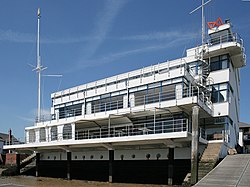Royal Corinthian Yacht Club
51°37′25″N 0°49′15″E / 51.6236°N 0.8208°E
 The Burnham-on-Crouch Royal Corinthian Yacht Club, designed by Joseph Emberton in 1931. | |
| Founded at Erith, Kent | 1872 |
|---|---|
| Clubhouse | Burnham-on-Crouch, Essex, and at Cowes, Isle of Wight |
| Country | |
| Website | http://royalcorinthian.co.uk |
The Royal Corinthian Yacht Club was founded at Erith, Kent in 1872 and since the 1930s has been based at Burnham-on-Crouch, Essex. The Club provided the crew for the Endeavour in Thomas Sopwith's America's Cup Challenge in 1934 after a strike of Sopwith's professional crew.
Burnham-on-Crouch
In 1931, a new clubhouse at Burnham-on-Crouch was opened. The Grade II* listed building was designed by Joseph Emberton and represented Britain's contribution to the International Exhibition of Modern Architecture held at the Museum of Modern Art in New York City in 1932.[1] The building is one of the few examples of the International style of architecture in Britain.[2][3] The club at Burnham has a stable membership of 550 and is well known on the east coast for organising one design regattas, a cruiser programme and a junior sailing programme called ‘Otters’.
Cowes
In 1948, the club established its southern branch at Cowes in the present clubhouse. The building has a varied history and started life as a fishermen’s beer house in the 18th century. In a different guise it gained some notoriety during the Edwardian period. It was operated by Rosa Lewis, a hotelier from London to provide a retreat and entertainment for gentlemen visiting the Royal Yacht Squadron.
Tiny Mitchell, Commodore of the Royal Corinthian in Burnham wanted to sail his 6 metre in the Solent and he bought the building from Rosa's estate, and set up the southern branch. It was run privately until his death, when the executors sold it to a consortium in the 1960s. It continued life as a private club until it was sold to a private individual at the end of the 1980s.
The new business was very heavily dependent on debt finance and foundered. The clubhouse was re-purchased from the receiver in late 1992 by a small group of members for the benefit of the club. The repayment of the financing of that purchase by all the members was completed in 1999, enabling the club to become a members club.
In November, 2014 RCYC (Cowes), which had been set up as a branch of the main club at Burnham on Crouch but had always been autonomous, decided to merge with the Royal Ocean Racing Club. This gave the RORC a south coast base.
Although the Royal Corinthian Yacht Club retains a friendly relationship with their former branch club at Cowes, and agrees to its members flying the same burgee, there is now no link between the Royal Corinthian Yacht Club at Burnham on Crouch and the RCYC (Cowes).
See also
References
- ^ Joseph Emberton, Architect. 1889-1956. Retrieved 2008-07-07.
- ^ Bettley, James & Pevsner, Nikolaus. (2007). Essex: Essex since 1914. (p. 69). Yale University Press. ISBN 0-300-11614-4.
- ^ University of Brighton. Design Archives: Joseph Emberton Archive. Retrieved 2008-05-20.
